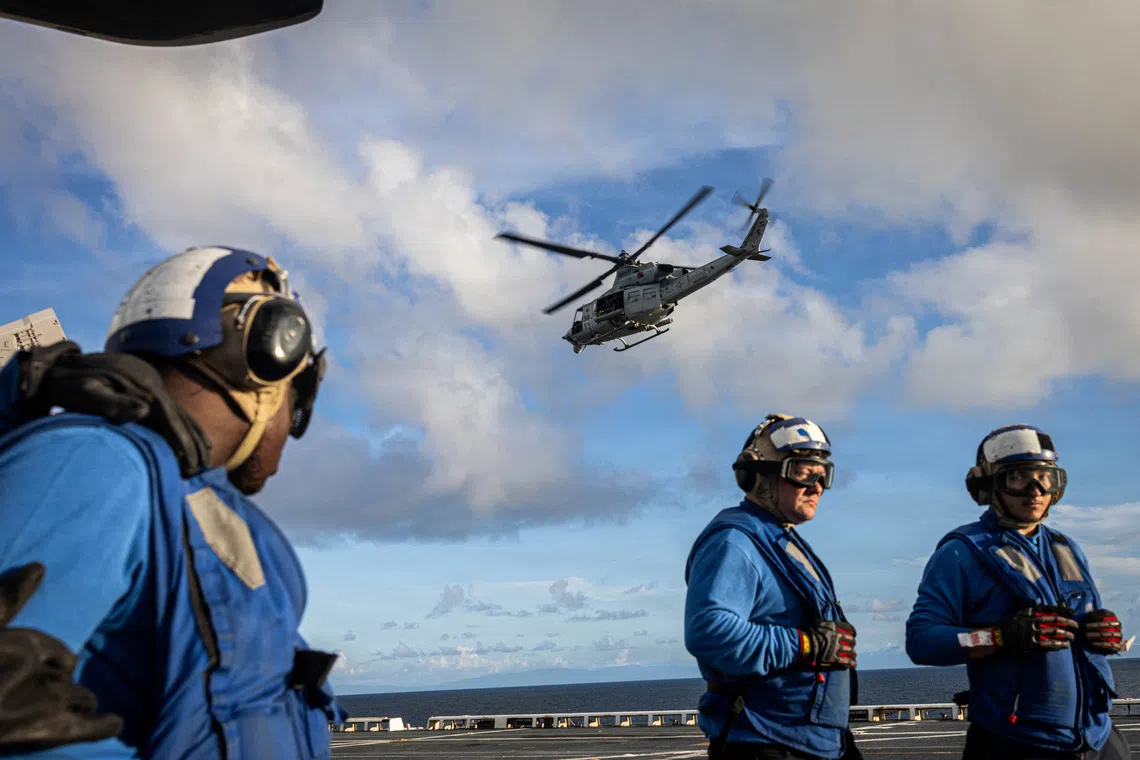US labels another Venezuelan group as terrorist, ramping up pressure
Sign up now: Get ST's newsletters delivered to your inbox

A US Marines UH-1Y Venom helicopter takes off from amphibious transport dock ship USS Fort Lauderdale while underway in the Caribbean Sea, on Nov 17.
PHOTO: REUTERS
Follow topic:
The United States on Nov 24 formally designated Venezuela’s Cartel de los Soles as a foreign terrorist organisation, layering additional terrorism-related sanctions on the group it has said includes President Nicolas Maduro and other high-ranking officials.
Venezuela’s government rejected what it called a “ridiculous” US plan to designate the “non-existent” group.
Secretary of State Marco Rubio said this month the US would designate Cartel de los Soles, or Cartel of the Suns, as a foreign terrorist organisation (FTO) for the network’s alleged role in importing illegal drugs into the US Maduro faces escalating pressure from President Donald Trump’s US military buildup in the Caribbean, raising concerns that the US may seek to use the designation to justify military action.
Sanctions experts, however, have said the statute for the designation does not authorise such a move.
The US for months has waged a campaign of deadly strikes against suspected drug trafficking boats off the Venezuelan coast and the Pacific coast of Latin America.
Reuters reported on Nov 22 that the US is poised to launch a new phase of Venezuela-related operations in the coming days.
US Defence Secretary Pete Hegseth said the designation would bring “a whole bunch of new options to the United States,” in excerpts released on Nov 20 from an interview with One America News.
US officials have accused Cartel de los Soles of working with the Venezuelan gang Tren de Aragua, which Washington also ties to Mr Maduro and previously designated an FTO, to send illegal narcotics to the US.

Venezuela's President Nicolas Maduro has accused the US of seeking regime change to control the country’s natural resources.
PHOTO: REUTERS
Maduro alleges US seeking regime change
Mr Maduro and his government have always denied any involvement in crime and have accused the US of seeking regime change out of a desire to control Venezuela’s natural resources, especially its vast oil reserves.
“They want Venezuela’s oil and gas reserves. For nothing, without paying. They want Venezuela’s gold. They want Venezuela’s diamonds, iron, bauxite. They want Venezuela’s natural resources,” Oil Minister Delcy Rodriguez said in comments on state television.
Mr Trump has said repeatedly he is not pursuing regime change.
“Venezuela categorically, firmly, and absolutely rejects the new and ridiculous fabrication by the Secretary of the US Department of State, Marco Rubio, which designates the non-existent Cartel de los Soles as a terrorist organisation,” said Venezuelan Foreign Minister Yvan Gil on his Telegram account.
The measure, Mr Gil added, revives “an infamous and vile lie to justify an illegitimate and illegal intervention against Venezuela, under the classic US regime-change format. This new maneuver will meet the same fate as previous and recurring aggressions against our country: failure.”
On Nov 24, Venezuela’s defaulted dollar bonds, which are trading around 30 cents on the dollar, rose as much as 1 cent each. The step-up in pressure from Washington has driven investor interest in the bonds, and Venezuela is the top performer among emerging market issuers this year with a 96 per cent return at the index level according to JPMorgan data.
The Treasury Department in July designated Cartel de los Soles, a reference to the sun insignia worn by Venezuelan generals, as a “Specially Designated Global Terrorist,” which froze its US assets and generally barred Americans from dealing with it.
InSight Crime, a foundation that analyses organised crime, said in August that it was an “oversimplification” to say Mr Maduro heads the cartel, saying that it “is more accurately described as a system of corruption wherein military and political officials profit by working with drug traffickers.”
Analysts also raised questions.
“As head of state overseeing the armed forces in a civil-military regime, is he in on it or at least aware of official military complicity with cocaine traffickers? Very likely,” said Mr Will Freeman, a fellow for Latin American studies at the Council on Foreign Relations. “But does that mean he is directing its movements and coordinating the drug flows? We have never had the information publicly to say.”
Legality of military action questioned
Experts have questioned the legality of the US campaign in the southern Caribbean and Pacific, in which the US military has killed dozens of people by blowing boats out of the water, citing suspicion that the vessels were carrying drugs.
A Reuters poll in November said only 29 per cent of Americans support using the military to kill suspected drug traffickers without a judge or court being involved.
A former senior Treasury Department official said while the designation could send a significant message to stay away from the cartel, it has never been suggested that the policy purpose of an FTO designation could be overlaid with the use of military tools.
“I sat in a number of meetings with various agencies, and never had it been suggested that by designating an entity as an FTO it would ... meet the standard for military action,” the former official said.
The addition of the FTO listing, considered Washington’s strictest terrorism designation, adds greater criminal liability for those who provide material support to the group, said Mr Peter Harrell, an international economics official in the Biden administration. REUTERS

